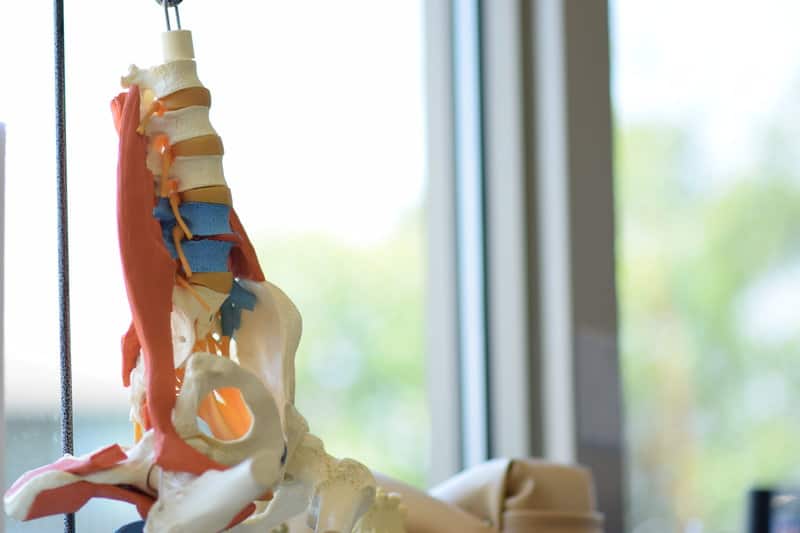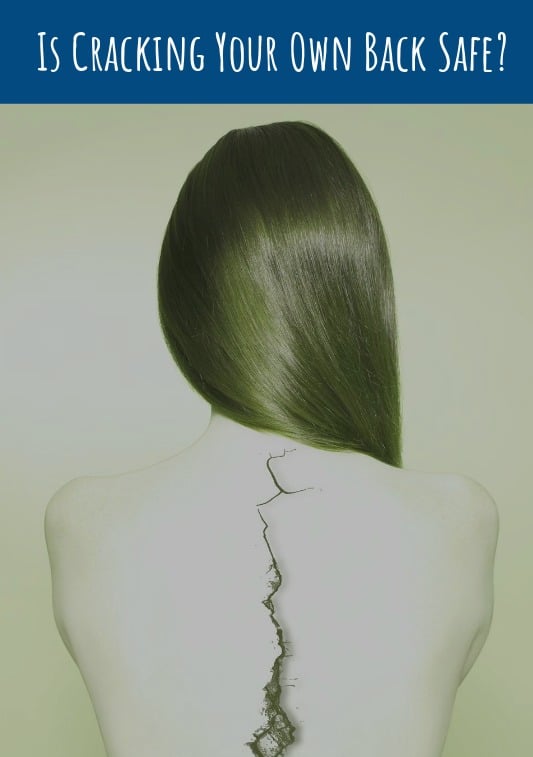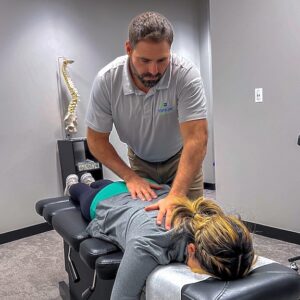So many back problems in the world today! 8 out of 10 adults have brief or long term back pain. No wonder so many people are turning to chiropractic care.
But what if you can’t get in to see a chiropractor because you can’t get out of the house or afford the costs? Can you do it yourself? Can you give yourself a chiropractic adjustment?
A lot of people believe they can watch a YouTube video or get one adjustment from a chiropractor then start cracking their own back – which is an odd idea when you consider that your typical chiropractor goes through over 4,600 hours of education to get their degree. That alone means there’s going to be a huge difference between self-cracking and having a trained chiropractor work on you.
Still, let’s talk about this. So many people are cracking their own backs these days (or letting a friend do it) and we think it’s very important to help people understand the issues that come along with self-cracking.

The Spine Works in Complex Ways
The spine itself is incredibly strong but the spinal cord, which is housed inside of the spine is precious and fragile. The spinal cord is busy with the neurotransmissions that enable feeling, movement and brain-body coordination. The brain sends signals down the spine to all of your vital organs and tissues. This communication system is critical for spinal health, overall body function, and quality of life. The spine gives you strength and balance to support that nervous system to keep your body alive, healthy and thriving.
The spine has 33 bones, each one sitting on top of another. These bones have soft cushioning tissues known as discs between them. These discs help with support. The discs also act as shock absorbers, allowing flexibility and protecting the vertebrae during movement. The spinal bones also have articulating joints linking them to other bones via cartilages.

Between the spinal bones and discs passes a network of nerves that link back and forth between the body and the spinal cord to the brain. This intricate system includes thousands of nerve fibers that branch out to control every organ and muscle in your body. Back pain often happens when these nerves are interfered with or pinched.
Since the nerves are responsible for signal transmission to and from the brain, damage or disruption can block the vital life energy from the brain, which can lead to tingling, numbness and reduced mobility. These blockages – often caused by subluxations – disrupt proper communication, leading to chronic pain and dysfunction.
The philosophy in chiropractic care is that many forms of illnesses – including upper and lower back pain, shoulder pain, headaches, lower immunity and even some emotional issues – are linked to spinal subluxations or compressions. Many people commonly refer to this as a pinched nerve.
From a chiropractic perspective, spinal misalignments interfere with the body’s ability to self-regulate and heal. Professional decompression therapy is often used to gently relieve pressure and restore alignment. Chiropractic adjustments and decompression has, in many cases, helped to achieve healing and functioning to allow your body to heal these conditions from within without the use of harmful medications, procedures, and surgeries.
Why It's Not Okay to Crack Your Back (It's Not the Same as a Chiropractor)
“Cracking the back” refers to the popping sounds that happen during a chiropractic adjustment (or sometimes when you stretch).
Cracking your own back is associated with good feelings and immediate gratification but can lead to detrimental effects without the specificity of a chiropractic adjustment. It mimics the spinal manipulation therapy (chiropractic manipulation) done by trained chiropractors but it’s not the same thing.
When a chiropractor performs a spinal adjustment, they use a refined chiropractic technique grounded in years of training to apply precise adjustments to targeted vertebrae. Sometimes there are “cracking” sounds that go along with this but the spinal adjustment happens whether you hear the cracking sound or not. They also have many other therapies to call on in addition to spinal adjustments.

The therapies available to an experienced chiropractor are extensive and the thrusting motion typically associated with spinal adjustments is just one of them. Chiropractors may also use soft tissue manipulation, massage, acupuncture, laser therapy, various modern technologies and more. Some patients also benefit from corrective care tailored to support spinal health, posture, and long-term function. Only from a specific care plan for your needs will you experience long lasting results from chiropractic.
Also (and hopefully obviously), before treating your back, a chiropractor first carries out a detailed examination to establish the cause and source of your problem – then they focus the adjustment and decompression on your specific areas of need. These evaluations often include posture analysis, range-of-motion testing, and spinal palpation to identify misalignments. Nothing about this process is random or by chance.
Cracking your back is not the same as chiropractic care and it is often unsafe. Chiropractors spend four to five years studying how your spine works and have years of experience working on patients.
If done by these professionals, spinal adjustments can be very healthy and beneficial. But doing it yourself at home is dangerous. You can pull or twist your spinal vertebrae out of place and it’s very likely you won’t even be able to tell which vertebrae need adjustment.
Attempting a self-chiropractic adjustment without clinical knowledge risks worsening existing issues or creating new ones. When self-cracking goes wrong, a simple back-cracking routine can lead to severe back problems like herniated discs and nerve compression.
The Risks of Self-Cracking (Cracking Your Own Back) Include:
- Limited mobility and loss of sensation from pinched nerves
- Muscles can tear around the back, which impairs flexibility and range of motion.
- Severe muscle injury that might need surgery to correct
- Chronic overstretched ligaments that cause perpetual instability and heighten your risk of osteoarthritis as you age
- Injury to blood vessels around the neck and back
Misalignments from repeated self adjustment attempts may lead to joint degeneration over time as well, especially without precise adjustments from a professional.
According to a 2022 review published in Healthcare, improper spinal manipulation – particularly chiropractic self adjustments – are common and can lead to serious complications, with cervical artery dissection being among the most severe though rare.
These risks are often overlooked because the initial relief from cracking can mask deeper structural issues, making individuals believe the technique is working when it may actually worsen their condition.
What Makes the Sound When You Crack Your Back?
The cracking and popping sounds happening during a chiropractic adjustment can be a sign that the therapy is effectively relieving the pressure from your spinal discs. Cracking your back at home could also indicate spinal vertebra instability, cavitation from gas release, or cartilage deterioration.
Experts explain that the primary cause of these popping sounds is cavitation – the release of gases like nitrogen, oxygen, and carbon dioxide from the synovial fluid within your joint capsules around the vertebrae on your neck and back. These capsules contain a fluid that helps to keep the joints working optimally and comfortably for you, similar to the oil in your car’s engine. When you stretch or adjust, the pressure inside these capsules changes, allowing the gas to escape and producing a “pop.” This natural phenomenon is similar to what happens when you crack your knuckles.
However, not all cracking sounds are the same. If the sound is accompanied by discomfort, pain, or a grinding sensation, it could suggest cartilage wear or joint misalignment. In this case, the pop is not from gas or release of pressure. Instead, it is as a result of bones rubbing together.
Another explanation for the popping sound as postulated by experts is gas build-up from misaligned joints. Experts believe that over time, gases like nitrogen, oxygen and carbon dioxide can build up in dislocated joints caused by poor posture or lifting movements. Stretching releases the gas, hence the cracking sound.
In some cases, repetitive or forceful self-cracking may indicate underlying instability or signal that something is out of alignment. That’s why intent and frequency matter – occasional, painless pops may be normal, but frequent or painful ones can be a red flag.
So, while cracking isn’t inherently bad, it’s essential to understand what’s causing the sound and how often it occurs. When in doubt, consult a chiropractor for a proper evaluation.
What makes that cracking sound when your back gets adjusted?

Can I Have My Friend Crack My Back?
A lot of people take this approach but it’s not recommended – and definitely not safe.
Letting someone else – such as a friend without medical training – crack your back may feel like a shortcut, but it introduces serious risks. A person who doesn’t have chiropractic skills or medical knowledge may push or twist your back too hard, leading to those injuries covered above. Even well-intentioned twisting or sudden motions can cause nerve impingement, joint strain, or soft tissue damage.
It’s common for people to ask their friends to walk on their back to ‘crack it into place.’ This is one of the most dangerous misguided techniques used at home. Walking on someone’s spine concentrates pressure in one small area and can result in spinal misalignment, rib fractures, or disc compression. Even if they’re lightweight, you could still sustain serious muscle, joint and bone injuries.
It takes an in-depth understanding of the inner workings of your back and other organs to manipulate your spine successfully. Without proper assessment, technique, and anatomical training, even light adjustments can do more harm than good.
So, no – letting a friend crack your back isn’t safer. It’s riskier. Leave spinal adjustments to licensed professionals trained in chiropractic technique.
I Popped My Back and Now It Hurts! What Happened?
Sometimes it feels good and relaxing to pop your back and so you may fall into the temptation of doing it repetitiously. But frequent or forceful cracking – especially without proper guidance – can backfire.
You may do it faster than is safe, or twist, pull and push too hard for a healthy and comfortable structural alignment. When that happens, you could irritate nerves, strain muscles, or misalign your spine further. The pain is a warning that you are overdoing it, or are doing it wrong and that you need to stop. If you ignore the pain, the next thing could be loss of mobility, numbness or serious damage.

Three Causes of Pain When You Pop Your Upper Back
- Joint strain and nerve injury
- Ligament laxity
- Muscle tears
What is the Difference Between Chiropractic Adjustment vs. Cracking My Back?
The only way for you to have the impression that your self-cracking was successful is the cracking sound or relaxation that accompanies it. But that’s not necessarily an accurate measure.
First off, you likely will never know what caused the compression or pain in your back. You will never know when and how to give your spine decompression or alignment manipulation. You may also never fully understand the risks involved in back cracking. A chiropractor uses a complete evaluation – including X-rays, posture analysis, and medical history – to build corrective care plans that address the root cause and long-term relief.
At the chiropractor’s, the treatment starts with an exam to establish your problem and cause. This may include x-rays, posture screenings and gathering a medical history.
The chiropractor will then choose from a variety of treatment techniques to accelerate your healing journey. Or they may give you a certain type of self-care exercise that you need to help your back.
The solution to your back or neck pain could also be as simple as a gentle massage that relieves tension in the muscles around your spine. Or maybe you might need a specific chiropractic adjustment to restore the healing function of your nervous system.
What makes chiropractic treatment effective is not just the technique, but the customization. Every patient receives precise adjustments designed for their body’s unique structure and needs.
At the chiropractor’s office, the choice, frequency and execution-style for these techniques is done with a keen consideration of safety and the patient’s medical history.
What if I Can't Find or Afford a Chiropractor?
Yoga, stretching and maintaining the right posture are helpful for maintaining a healthy back and neck. If you cannot afford or see a chiropractor at this time, here are some options to help keep your spine healthy:
- Watch yourself when you sit, stand or lift-maintain a straight back, stop slouching
- Substitute your office chair with a stability ball every once in a while
- Exercise daily focusing on building strength AND flexibility
- Add yoga to your workout routines to improve posture and alignment
- Use budget-friendly tools like lumbar supports, foam rollers, or ergonomic seat cushions to relieve daily strain and support spinal health
Those aren’t a replacement for chiropractic care but they may help – even for people already seeing a chiropractor.
The Bottom Line
Self-cracking is all too common these days. But it is dangerous and carries many unnecessary risks.
If you have any doubt about the difference between cracking your own back and a chiropractor adjustment, do yourself the favor of visiting a reputable chiropractor at least once for an evaluation and adjustment so you can experience it for yourself.
Self adjusting may seem convenient, but without professional chiropractic care, you’re risking more harm than good. Always weigh the benefits of safe, customized care over temporary relief.
Book your appointment today at Evolve Chiropractic.
Best of luck on maintaining a happy and healthy spine!





